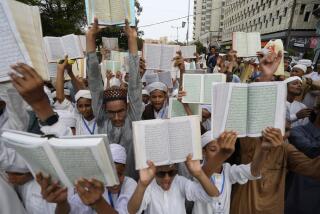Forgotten Lapps Struggle to Find a Voice
- Share via
STOCKHOLM, Sweden — Lapps say their lot has changed in 30 years from open discrimination to a subtler atmosphere in which they are ignored or shunned.
In the old days, Lapp children were punished if they spoke their native language at school. The sooner the better was the official attitude toward Lapps learning Swedish ways.
Now, the arctic reindeer herders say, both officials and Swedes in general seem to be avoiding them.
Lapps say they are not consulted about matters concerning their northern wilderness.
Others control the distribution of reindeer meat. Sometimes, when a Lapp enters a bar, other patrons move away.
National news media seldom cover Lapp events. They report only occasionally on the long dispute between reindeer herders and landowners who seek to deny Lapps their customary grazing rights.
Landowners say reindeer eat the buds from trees. Lapps accuse the landowners of killing their animals.
Finding a place for Lapps in society poses moral problems for Swedes, who are known for opposing racism in other countries.
“It should be the responsibility of us all to stop doing injustice to our Swedish people of origin,” Peter Nobel, a government ombudsman on discrimination, wrote recently.
“This is important for our national prestige and for our ability to call attention to injustices in other parts of the world.”
Swedish television broadcast its first live report this summer on the Lapps’ annual branding of reindeer calves.
The government plans to introduce legislation this fall that would force northern landowners to consult with Lapps before felling trees for the pulp industry.
It would give all Lapps the right to herd reindeer in the wilderness, including those whose families strayed from Lapp customs decades ago. Only Lapps whose parents or grandparents were herders now can claim the right.
Lapp leaders want more comprehensive reforms, covering all aspects of life.
For one thing, they don’t want to be called Lapps. The preferred term is Sami, a word from the Finno-Ugrian language they speak.
“We don’t want to be put in a museum, in a researcher’s notebook or as paragraphs in government documents,” said Ingwar Ahren, vice president of the National Assn. for Swedish Samis.
“People only see us when there is trouble,” Ahren said in an interview. “We must be given a possibility to speak for ourselves, to establish our own institutions.”
Olof Sikko, an economist who is Sami, said no language or cultural courses are available in high school or colleges. The few Sami-language newspapers do not publish in all three of its dialects, and programs in the language get short shrift from Swedish radio, he said.
An estimated 60,000 Samis live in Sweden, Norway, Finland and the Soviet Union. They call their territory Sapmi, and some herdsmen roam freely across national borders.
Herders still suffer from fallout caused by the 1986 Chernobyl nuclear reactor explosion and fire in the Soviet Union, which spread radioactivity over much of Scandinavia.
About 25% of the reindeer slaughtered last year could not be eaten because of dangerously high cesium levels caused by grazing on wild plants.
Of the 20,000 Swedish Samis, about 2,500 live on reindeer herding, hunting and fishing. Houses have supplanted hide tents and snow scooters are more common than sleds pulled by reindeer.
Many Samis say opening the rights to herd reindeer and to hunt and fish on government land to all members of the ethnic group could stem a drift to the cities.
More to Read
Sign up for Essential California
The most important California stories and recommendations in your inbox every morning.
You may occasionally receive promotional content from the Los Angeles Times.













